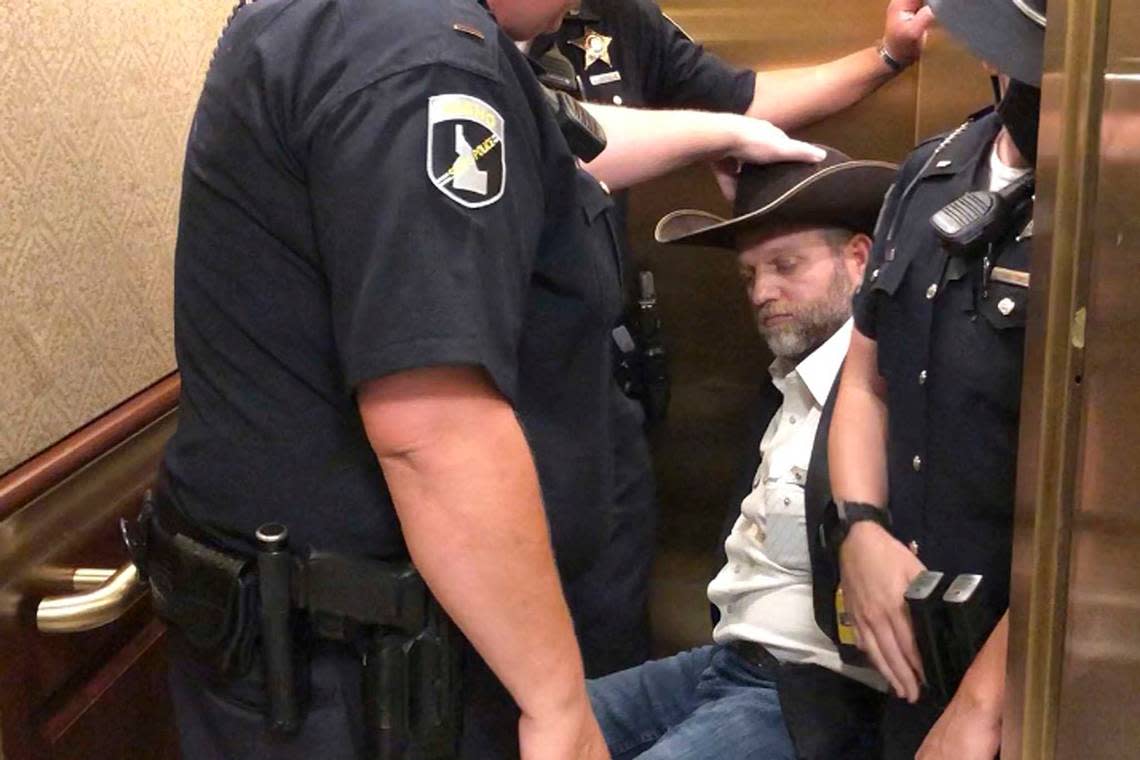Jury begins deliberating Ammon Bundy’s fate. Here’s what happened at the trial

- Oops!Something went wrong.Please try again later.
- Oops!Something went wrong.Please try again later.
The jury trial for Ammon Bundy stretched into a tumultuous fourth day Thursday, but the case has finally neared an end, as the jury was sent to begin deliberations early in the evening.
Bundy, an Emmett resident, and Aaron Schmidt, a Coeur d’Alene resident, face single charges of misdemeanor trespassing after they were both arrested on Aug. 25, 2020, inside the Lincoln Auditorium of the Idaho Capitol. Bundy also faces a single misdemeanor count of resisting or obstructing officers.
Before closing arguments, much of Thursday’s testimony involved arguments over admissibility of evidence and people called as defense witnesses.
Most notably, defense and prosecution argued whether or not the events of the day before Bundy and Schmidt’s arrest — Aug. 24 — was a topic that could be discussed. Prosecutors argued that the door had been opened when Bundy testified in regard to the substantial police presence on the day of his arrest. Multiple defense witnesses also testified about the police presence when Bundy and Schmidt were arrested.
On Aug. 24, a large number of people pushed their way into the House Gallery, breaking a glass door in the process. Spectators were not originally going to be allowed during the August special session because of the coronavirus pandemic, but after pushing their way inside, they were allowed to stay. Prosecutors argued that troopers increased their police presence the next day in case a similar unruly act took place.
Judge David Manweiler allowed that testimony, leading prosecutors to recall two Idaho State Police troopers to the stand. Sgt. Blake Higley, who is the head of security at the Statehouse, told the court that the number of people at the Capitol on Aug. 24 greatly outnumbered police and that people did not follow police instructions that day.
Later in the day, Rep. Tammy Nichols, R-Middleton, was called by the defense to the stand to testify regarding her past experience in using the Lincoln Auditorium. Before she took the stand, the defense and prosecution argued over whether Nichols could be called, as the court was under the impression that Bundy’s attorneys had rested. After that, Schmidt, who is representing himself in court, began calling his own witnesses.
Manweiler allowed Nichols to testify, but in a very narrow sense as to her interpretation of House rules. Nichols told the court that from her understanding, the auditorium is typically open, as sometimes self-guided tours can access the room. Similar testimony was also offered by Republican Reps. Christy Zito and Judy Boyle, who both said Wednesday that they’ve known the Lincoln as a room to be open to the public.
House Speaker Scott Bedke testified earlier in the week that the room is indeed open to the public when official business is being conducted. It is closed and locked when not in use, Bedke said, and he had ordered it closed after that day’s business wrapped up.
Jury instruction began around 4:20 p.m., as Manweiler outlined the process and considerations needed in coming to a verdict in the case. The state began its closing statements around 4:30 p.m., and Kirsten Ingle, a deputy prosecutor for Ada County, said in closing remarks that Bedke had lawful authority to order the room to be closed, and both Bundy and Schmidt violated the law when they refused to leave the Lincoln Auditorium.
Bundy was nonresponsive when told to leave, she said. When ISP troopers twice told Schmidt to leave, he twice responded by asking whether the troopers were wearing body cameras. Ingle said ISP troopers were acting lawfully and carrying out an order from the proper Statehouse authority.
Schmidt, who is representing himself, said in closing remarks that he wasn’t given the opportunity to leave the room before he was arrested. He thanked the jury for their patience over the course of the trial, and asked them to find him not guilty.
Sam Bishop, one of Bundy’s attorneys, said in closing that convicting his client would set a dangerous precedent. He argued that if Bedke could remove Bundy, he could do the same for others inside areas of House control at the Capitol.
Bishop told the jurors that they did not have to agree with the way Bundy decided to protest, or his message or his views. But he asked the jury to defend what he said were Bundy’s rights to speech.
“This is where we have to draw the line, no one else can do this for you,” Bishop said.
In a brief rebuttal, Ada County Deputy Prosecuting Attorney Whitney Welsh reiterated that Bedke absolutely has the authority to close rooms, especially given that all business was done for the day during a special session.
Welsh pointed to Bundy’s testimony in which he told the court he didn’t believe he was breaking the rules, saying that’s not a defense for committing a crime.
“(Bundy) cannot come in here and admit every single element of these crimes, and then say, ‘I don’t believe in them,’” Welsh said.
She said the cases boiled down to basic elements: The men arrested did not depart the room when asked multiple times. She said Bundy continued to violate the law by going limp and impeding troopers from arresting him.
The jury went into deliberations just before 5:30 p.m., and Manweiler gave members the option of continuing into the night or restarting in the morning. They were still deliberating at 6:30 p.m.

